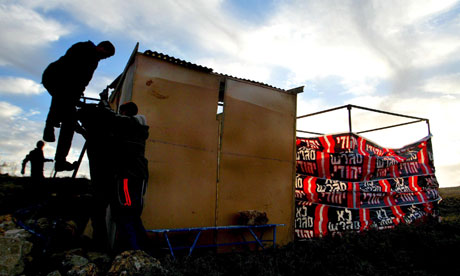Palestinians ‘will not resume talks without new freeze on settlements’
![]()
Palestinians ‘will not resume talks without new freeze on settlements’
Israeli refusal to extend a freeze on new construction frustrates America’s efforts to keep talks alive
Harriet Sherwood

The Palestinian leadership confirmed yesterday that it would not return to direct peace negotiations with the Israelis without an extension to the now-expired freeze on settlement construction, amid determined but increasingly frustrated efforts by the Americans to keep the talks alive.
The executive committee of the Palestinian Liberation Organisation met in Ramallah to consider its position following the end of the moratorium last weekend. Palestinian negotiators have said repeatedly that they would not stay at the negotiating table unless the freeze were extended, and that Israel must choose between settlements and peace.
“The leadership confirms that the resumption of talks requires tangible steps, the first of them a freeze on settlements,” said Yasser Abed Rabbo, a senior PLO official, speaking after the meeting. “The Palestinian leadership holds Israel responsible for obstructing the negotiations.”
Nabil Abu Rdainah, a spokesman for the Palestinian president, Mahmoud Abbas, said efforts had reached “a dead end”. “There will be no negotiations in the shadow of continued settlement,” Abu Rdainah said. “All the while Israel is not convinced that the political process be based on international law and justice, matters will remain in a state of paralysis for a long time.”
Abbas is unlikely to make a definitive statement on whether the Palestinians will formally withdraw from the talks until a meeting of the Arab League in the coming week. Originally scheduled for tomorrow, the meeting has already been moved to Wednesday and may be postponed again until Friday to give US negotiators more time to try to broker a deal.
Prospects for a compromise on the issue of settlement building appear to be receding. The Israeli government is reported to have rejected a US proposal last week, under which the Americans offered a raft of guarantees – including increased military aid for Israel – in exchange for a 60-day extension.
Washington’s middle east envoy, George Mitchell, and the EU’s foreign policy chief, Catherine Ashton, were both in Jerusalem and Ramallah last week in the attempt to bring the two sides closer together, without any apparent movement in positions.
The Israeli prime minister, Binyamin Netanyahu, is thought to be unwilling to test the robustness of his right-wing coalition government by proposing an extension to the freeze, however, some commentators believe he could drive it through with sufficient political will.
The Israelis are now attempting to deflect blame for the expected breakdown of talks on to the Palestinians. “Now I expect the Palestinians to show some flexibility,” Netanyahu was quoted as saying at the end of last week. “Everyone knows that measured and restrained building in Judaea and Samaria [the West Bank] in the coming year will have no influence on the peace map.”
Related Articles
Palestinian flag raised at UNESCO after admission
![]()
PARIS – Agence France-Presse Palestinians wave their national flag in front of the headquarters of UNESCO during a march to
Gaza / Israel: a propósito del anuncio por Bolivia de ruptura de sus relaciones diplomáticas con Israel
![]()
El 31 de octubre del 2023, Bolivia anunció formalmente que rompe sus relaciones diplomáticas con Israel, , ante el drama absoluto al que se ve sometida la población civil palestina por parte de Israel
Tony Blair: Israel must reassure Palestinians that statehood is possible
![]()
Quartet representative calls on Israel to ‘lift weight of occupation’ to aid peace process, during interview with the Guardian Chris



